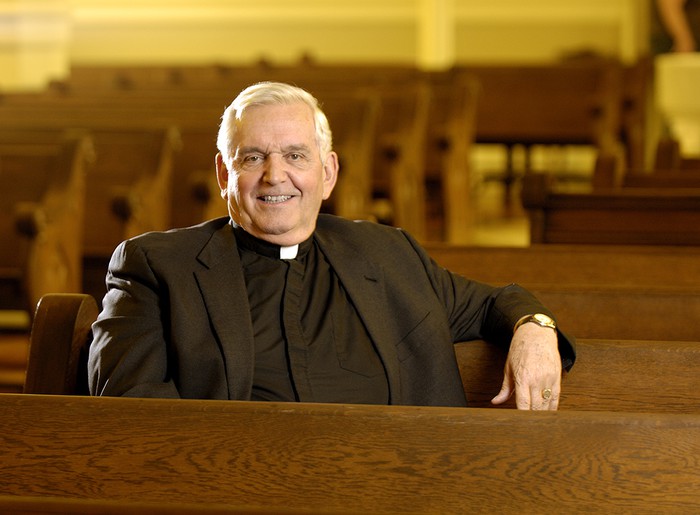
MOBILE, Alabama — Fr. Gregory Lucey, S.J., who died Sept. 30 at age 88, was living embodiment of how most of life can and should transcend politics, and of how a man of faith should act.
Lucey spent two stints as president of Spring Hill College here in this Gulf Coast city and also headed the national Association of Jesuit Colleges and Universities, an umbrella outfit that oversees 28 such schools in the U.S. As such, he had a profound effect on many thousands of students and the institutions that served them — and also on the greater community of Mobile, where for decades he was a strong but genial presence at almost every worthwhile cultural endeavor.
And in an age where academicians seem constitutionally incapable of separating scholarship and politics, Lucey studiously avoided the temptation to spout off. Oh, sometimes with body language or eye rolls he would betray a latent liberalism, but he knew that tending souls is more important than temporal politics.
Yet if any university president had politics in his blood, it was Lucey. His much older brother Patrick, in the Irish-Catholic northern American tradition, was a Democratic governor of Wisconsin and a strong Kennedy family ally in the 1960s and 70s. When liberal Republican Rep. John Anderson of Illinois ran an independent bid for the White House against Ronald Reagan and Jimmy Carter in 1980, he chose Patrick Lucey, seen as a reliably liberal reformer, as his running mate.
Fr. Gregory Lucey, though, knew that the personal supersedes the political. Among his good friends was a very conservative publisher of the daily newspaper, and he was close friend and pastor to conservative Republican former U.S. Rep. H.L. “Sonny” Callahan of Alabama. Indeed, so close was he to Callahan that when the latter died on June 24 of this year, the 88-year-old Lucey flew down from Wisconsin, where he had retired, to officiate and give the eulogy at Callahan’s funeral in Mobile. It was at the reception afterward that I last spoke to him, when he made a point to amble over to join me and former U.S. Attorney General Jeff Sessions — two more conservatives! — in conversation, with a smile and a quip and even a compliment for some recent column I had penned.
Lucey was always like that, warm and engaging, whether he saw someone while on an exercise walk through campus or at a symphony orchestra performance. And he saw the university’s community as extending broadly. If the out-of-town Episcopalian brother of the Episcopalian husband of a devout Catholic wife died unexpectedly, Lucey would be sure, unbidden, to include that brother’s life among those celebrated at an annual mass at the St. Joseph’s Catholic campus chapel remembering friends of the college who had died in the prior year.
And Lucey’s homilies were always superb, a mix of learning and gentle humor and profoundly compassionate faith. He never forgot his calling as a priest first, even though as school president he saved a little college on the brink of failure. Indeed, he transformed a campus with lovely grounds but wholly inadequate (and oft-unattractive) buildings into a place both of more fully realized beauty and practicality, also placing it upon firmer financial footing.
Just three months ago, Lucey was remarkably vigorous and sharp for 88, giving the impression of someone who would make plenty more visits down South. He died last week, as they say, “peacefully in his sleep,” a man of consequence and grace.
